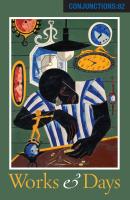![[A Reading by Diane Ackerman]](http://www.conjunctions.com/images/event_image.php?id=133037) On Monday, October 30, at 2:30 p.m. in Weis Cinema, Bertelsmann Campus Center, Diane Ackerman reads from The Zookeeper’s Wife. Presented by the Innovative Contemporary Fiction Reading Series, introduced by novelist and Bard literature professor Bradford Morrow, and followed by a Q&A, the reading is free and open to the public; no tickets or reservations are required.
On Monday, October 30, at 2:30 p.m. in Weis Cinema, Bertelsmann Campus Center, Diane Ackerman reads from The Zookeeper’s Wife. Presented by the Innovative Contemporary Fiction Reading Series, introduced by novelist and Bard literature professor Bradford Morrow, and followed by a Q&A, the reading is free and open to the public; no tickets or reservations are required.The Zookeeper’s Wife, a little known true story of WWII, enjoyed months as the New York Times #1 nonfiction bestseller, was the basis for the 2017 feature film of the same title, and received the Orion Book Award, which honored it as “a groundbreaking work of nonfiction, in which the human relationship to nature is explored in an absolutely original way through looking at the Holocaust. A few years ago, ‘nature’ writers were asking themselves, How can a book be at the same time a work of art, an act of conscientious objection to the destruction of the world, and an affirmation of hope and human decency? The Zookeeper’s Wife answers this question.”
Diane Ackerman’s other works of nonfiction include An Alchemy of Mind, a poetics of the brain based on the latest neuroscience; Deep Play, which considers play, creativity, and our need for transcendence; A Slender Thread, about her work as a crisis line counselor; The Rarest of the Rare and The Moon by Whale Light, in which she explores the plight and fascination of endangered animals; On Extended Wings, her memoir of flying; and her bestseller, A Natural History of the Senses. Her most recent book, The Human Age: The World Shaped by Us, a celebration of the natural world and human ingenuity, and an exploration of human-driven planetary change, received the P.E.N. Henry David Thoreau Award for Nature Writing.
Several of Ackerman's books have been Pulitzer Prize and National Book Circle Critics Award finalists. She also has the rare distinction of having a molecule named after her—dianeackerone— a pheromone in crocodilians. Her essays about nature and human nature have been appearing for decades in the New York Times, New Yorker, American Scholar, Smithsonian, National Geographic, and elsewhere.
Any supporter who donates $500 or more to Bard’s literary journal Conjunctions receives a BackPage Pass providing VIP access to any Fall 2017 or future event in the Innovative Contemporary Fiction Reading Series. Have lunch with a visiting author, attend a seminar on their work, and receive premium seating at their reading. Or you can give your BackPage Pass to a lover of literature on your gift list! To find out more, click here or contact Micaela Morrissette at [email protected] or (845) 758-7054.
